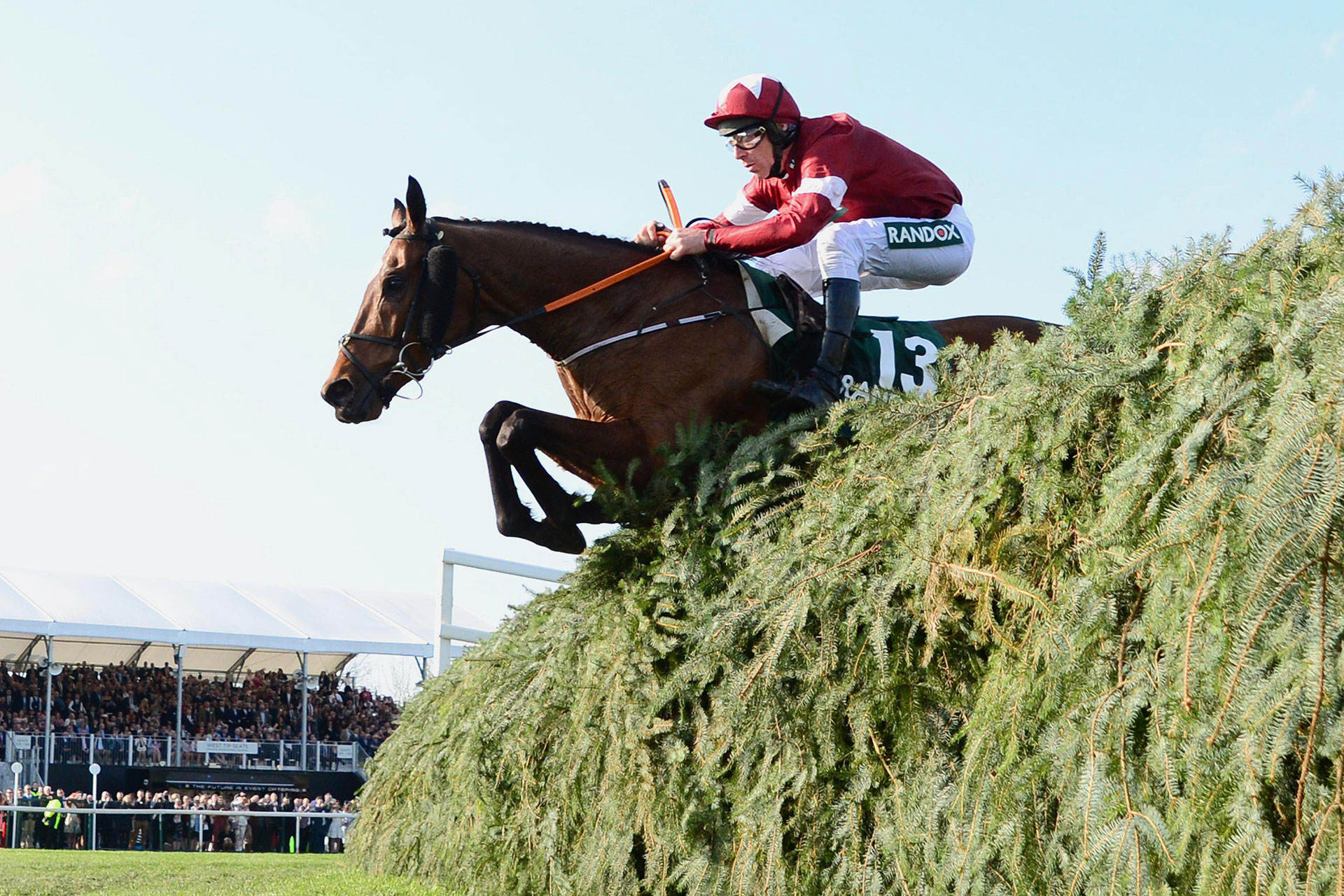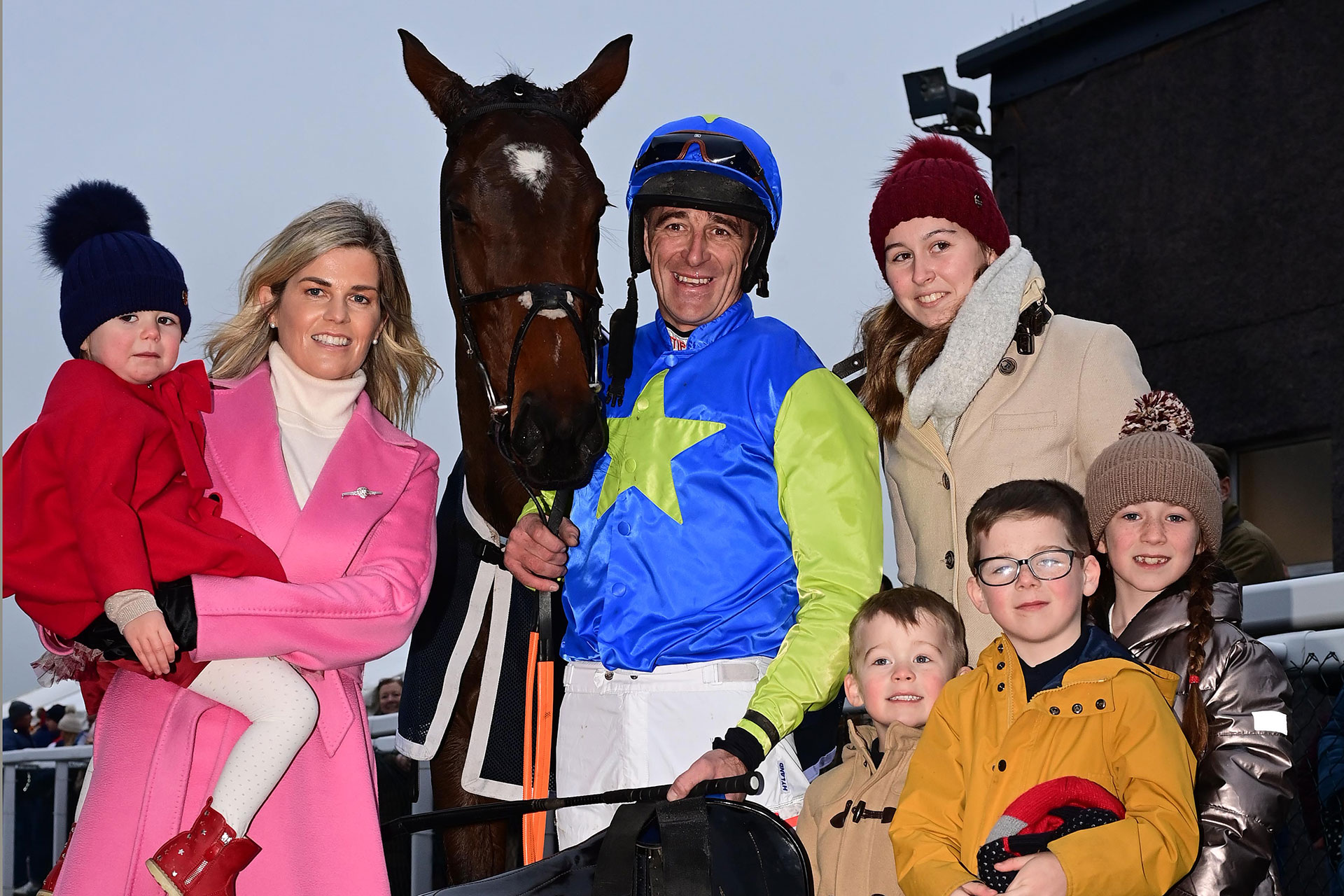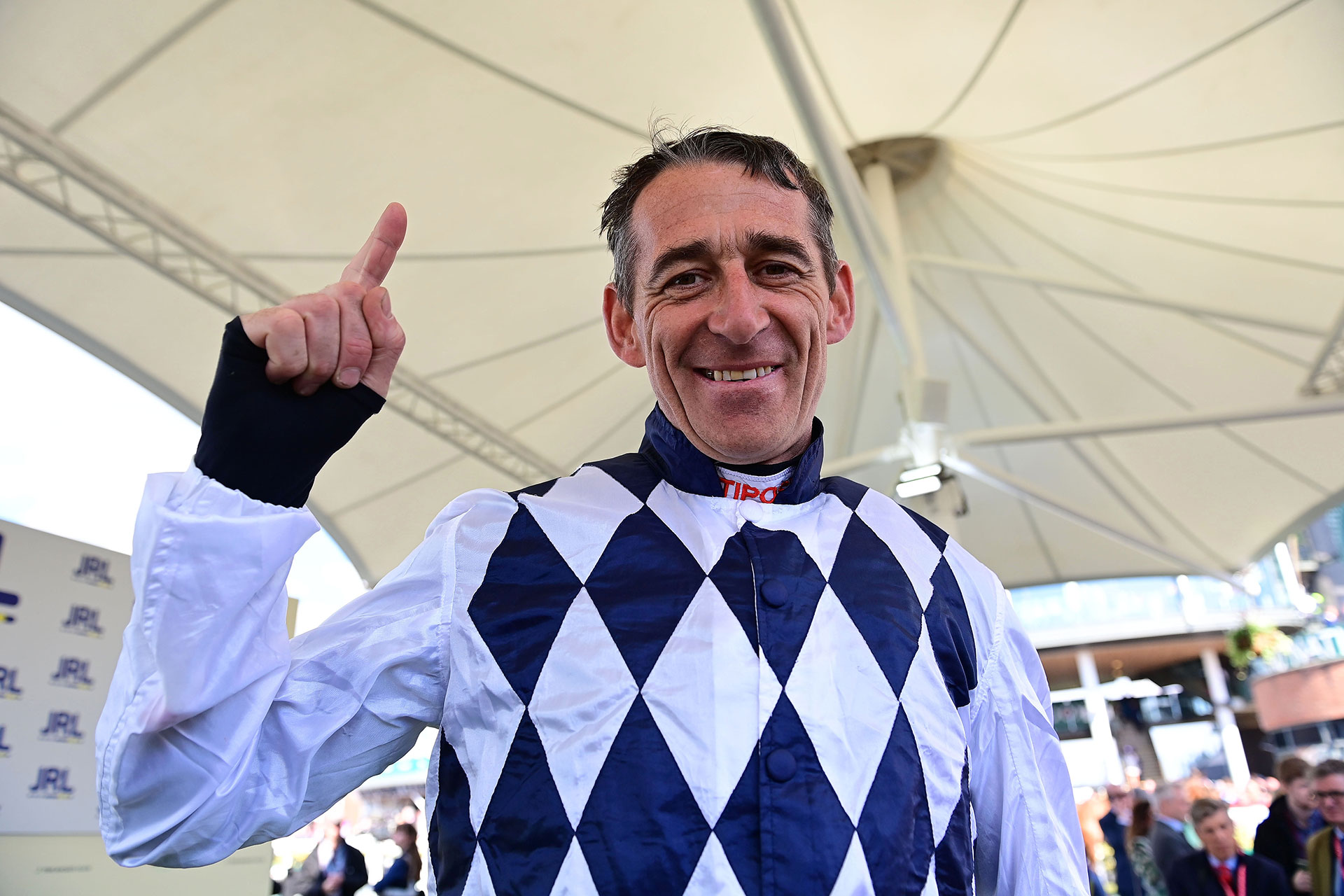Davy Russell
No Regrets
Davy Russell channels his inner Edith Piaf as he recounts some of the highlights of a remarkable career and the drama of his return from near paralysis to retire – twice in four months – on his own terms
Words: Denis Walsh • Photos: Healy Racing
When Davy Russell came back for the second-last time, before he retired for the first time, he had spent 11 months recovering from a broken neck. The surgeon told him that 90% of people would be paralysed after the injury he had suffered in October 2020; Russell belonged to the blessed one in ten.
He was 41 years of age by then, with nothing left to do in the saddle that was new, or more important than anything he had done before. Bad luck and good luck had come to a resolution and offered him an easy way out.
The general assumption was that he wouldn’t come back. Why would he? Russell had a lot of time to think. The last thing he considered was stopping. What other people thought only mattered in a tiny constituency close to his ear and his heart. He refused to surrender whatever control he had left. That was the thing: the fall had not taken away his power to decide.
“Retiring was not seriously on my mind,” he says. “I knew it would be an option. I was of the age where I could retire. I suppose when I broke my neck in Limerick everybody had me retired anyway – bar my wife and Gordon (Elliott). I don’t know what he was thinking but what he was saying was that all the horses were there for me.
“But it got to a stage where I was never retiring because of an injury, if I could prevent it. It was nearly an incentive to get back. I didn’t want to retire through injury. I wanted to retire riding. I mentioned to my surgeon, Dr Joe Butler, about riding again and he said, ‘Your neck is probably stronger now than before you broke it.’ He said, ‘It’ll be rigid and it’ll take an awful lot of work but that’s up to yourself. You’re well entitled to come back and ride. It would be very unfortunate for anything to happen again.’ That flicked a switch in me that retirement wasn’t an option. It was only a case of getting my body back fit enough and mobile enough.”
You wonder about his nerve. Was it frayed? Did he worry that it wouldn’t be there when he needed it? Not every jockey reaches the end of their career with their courage intact. Russell had survived a fall that could have paralysed him. But he had processed all that. You can’t get to a fence hoping it’s there. It never left.
“My nerve was never a problem – even to this day, it’s not a problem. I’ve no fear.” He pauses.
“Of anything, really. I don’t know what it is, I’m just lucky. I don’t know what way I’d put it but I was never really… Like, (Paul) Carberry was a fucking all-out rider, he’d lay everything on the line. Whereas I was a little bit more calculated. I was never wild with my riding as such. I used always ride on feel. If it felt right I’d go with it and if it didn’t feel right I’d manoeuvre it into my favour. I never frightened myself really. I never got a fright. “I had huge trust in horses. The horse will figure it out anyway (at a fence) to the best of his ability. The only thing I’d think at the back of a fence after a fall is, ‘Wasn’t that unlucky for that to happen?’ Rather than saying, ‘I should have done this,’ or ‘I should have done that.’”
In the beginning point-to-points were his arena. Looking back now, it was a different universe. There were more farmers with a recreational horse and more small traders hoping to turn a buck. Every point-to-point had a race dance. Crowds were bigger. The season was shorter, but it was vibrant and it flew from Sunday to Sunday.
“It was some craic now. It was the best craic of all time. All innocent fun. We’d meet on a Monday evening to watch a replay of all the races and you’d be looking forward to the next Sunday.
“I’m not pining for it. I absolutely emptied the tank all the way to Aintree. Everything my body could possibly give, I gave it”
“When I started it was starting to get a bit more professional. Horses were starting to be schooled properly. I remember, when I was a young lad, before I ever rode a winner, I went to Skibbereen to school a horse. It took me two and a half hours to get down there in a 1979 Toyota Starlet and when I got down there I was jumping over square bales of straw. You’d often see fellas making their own fences stuffed with Christmas trees. That day was soon gone. It was getting very much more professional all the way through.”
When Russell joined the paid ranks his first big job was with Ferdy Murphy in the north of England. By then he had ridden 150 point-to-point winners and 70 under Rules. He was 23. Still young and full of promise. He lasted 14 months with Murphy. By the end the trainer thought he was spending too much time back in Ireland, building his profile with Sunday rides. They had no falling out but there was a parting.
“I was always happier in Ireland. I loved riding in England, but it was just more comfortable in Ireland. In England, it was tough, tough going. My weight was a huge issue and I wasn’t really set up properly. I had no house as such. The only reason I stayed so long was that I was living with Paul Murphy, Ferdy’s son, and he was so good to me, him and his partner. They looked after me like a child basically. That was probably the only reason why I stayed for so long.
“It was a huge start for me. It was a brilliant start. I’d always revert back to things Ferdy would have said to me. I think he set the tone for the kind of rider that I was. I kind of progressed from what he had started me as. I found going from riding point-to-points to riding as a professional an incredible jump. Something I wasn’t prepared for. I thought I would gradually slot into a professional jockey but it was tougher than that. Up until Ferdy died we were very close. He was a good man. You’d take an awful lot from him.”
When he came home Russell steadily built his contacts and his numbers, but the relationships that transformed his career were with Gordon Elliott and Michael O’Leary’s Gigginstown House Stud. Elliott and Russell were friends since their days as amateur jockeys and when Elliott started as a trainer, Russell’s father Jerry sent him a few horses.
When Russell was hired by O’Leary to be his retained jockey in 2007, Elliott’s yard was still in its infancy, but over time all of those relationships overlapped. Elliott became one of Gigginstown’s most trusted and patronised trainers, and Russell was Elliott’s go-to guy, regardless of the silks. When Russell’s retainer with O’Leary ended suddenly on New Year’s Eve 2013, Elliott’s confidence helped to break his fall.
“It was huge. I understood him and he understood me. It was a big, huge team effort up there but it just clicked. We never had a cross word or we never misunderstood each other – ever. There was never a problem. We didn’t have to wait that long until the next winner came along. They came fairly quick. Once I was on point he had horses on point pretty much 12 months of the year – which is not an easy thing to do.”
Less than three months after losing the Gigginstown gig Russell rode three winners in a day at the Cheltenham Festival, including two in those famous maroon silks. The glittering centrepiece though was Lord Windermere in one of the most chaotic Gold Cups imaginable. The timing couldn’t have been kinder.
In big races, winning rides are often hailed as masterful. Russell makes no such claim. On the first circuit it looked as if Lord Windermere was going to be tailed off and there was nothing Russell could do to have him any closer. What Russell brought to the party was canniness and calm. He delayed losing the race for so long that winning was suddenly a possibility. Five horses jumped the last with a chance and fanned out across the track.

“You couldn’t tell him what to do. He’d want to be happy doing it… When he’d land at a fence I’d let him feel he was the bossman”

Edelle and the children Lily, Tess, Liam, Finn and Jaimee were at Thurles when Russell retired with a winning ride on Liberty Dance, but as a former elite pole vaulter and Irish record holder, his wife understands the psychology of high performance sport, so she supported his decision to return and encouraged him to continue after a disappointing Cheltenham
“We were going so fast (on the first circuit) that you wouldn’t have time to think of anything. Like, it’s so fucking fast. Now, you might think it’s three miles and two furlongs but it’s the fastest race at the meeting – that and the two mile handicap chase (Grand Annual). You’re riding a classy horse but I never rode a horse that travelled in a Gold Cup. That day it felt to me like we were going so fast, I mean boot to the board.
“If you’re driving a tractor and you have the boot to the board and smoke’s coming out through the exhaust it’ll only last for so long, so you have to ease off the throttle at some stage. That’s basically it – I just eased off the throttle. Kept enough on that I was staying in touch. There was no science to it, or anything like that. That’s all I was doing, trying to stay close enough for something to happen. What was going to happen, I had no idea.”
Cheltenham was good to Russell. For 13 seasons in a row he came away from the festival with at least one winner. When he rode another three winners in 2020 he took his career tally to 25, putting him joint-fifth among the winning-most jockeys at the meeting since the second World War.
The same day that Lord Windermere won the Gold Cup, Russell rode Tiger Roll to win the Triumph Hurdle. Bryan Cooper was injured and Gigginstown turned to the jockey they had jilted. In his long career Tiger Roll had a selection of partners and Russell didn’t ride him again at Cheltenham until 2022, the gelding’s valedictory appearance there, eight years after the Triumph. For Russell and Tiger Roll, Aintree was their portal into history. In Russell’s front room are two footrests embroidered with images of Tiger Roll, one for each of the Grand Nationals they won together.
“The Grand National is the one race that changes your life. Completely changes your life. More than the Gold Cup? Definitely. It’s just the amount of countries it hits. You walk down the
It is virtually impossible to win the Grand National.
I was in that very small percentage that was lucky enough to win it. “The first year, I didn’t think we’d get around. He had an awful habit of bulldozing through fences, and he’d get away with that with a park fence. I showed him the fence across the Melling Road and he sat back on his hocks. He knew he was jumping something different, he was paying attention to what he was doing.
“It’s all about speed (at the fences). I’ve ridden good leppers in the Grand National and got bad spins off them. Bad jumping spins. Too safe and over-jumping and you had horses winging by you.
“I knew if I kept him on his feet he’d have a squeak. I genuinely do believe that no one else would have won a Grand National with him only Gordon Elliott. There’s no doubt in my mind. The way he prepared him for the race through the cross-country races changed his respect for an obstacle. Like, he had none whatsoever. He didn’t care what was in front of him, he would gallop through it, until he went schooling cross-country fences.
“The Grand National is the one race that changes your life. Completely changes your life. More than the Gold Cup? Definitely”
“I was very worried about him not getting home. He could lock on, but there’s a happy medium of him doing too much and not doing enough. He wasn’t a horse that took encouragement very well. You couldn’t tell him what to do. He’d want to be happy doing it. He wouldn’t do it just because you told him. When he’d land at a fence I’d let him feel he was the bossman.”
The last comeback was unplanned. Jack Kennedy was injured at Naas in mid-January and for the spring festivals Elliott needed a senior jockey who knew the ropes and was intimate with the horses. Russell spoke to his wife Edelle and with her blessing he returned.
In the end, nothing was straightforward. In the final race of the Dublin Racing Festival at Leopardstown, where he’d won a Grade 1 on Mighty Potter, he took a fall and was kicked by a horse coming behind. A couple of wings on one of his vertebrae had been fractured.
“It was the same as if Tyson Fury had hit me bang there into my back. My whole back just locked. I was in woeful pain. I broke a couple of ribs as well and the pain was savage.” The extent of the injury wasn’t made public and when he got back just in time for Cheltenham he believed he’d get through the week. By day three he was struggling; for day four he stood himself down, just before the Gold Cup.
By then, he was involved in a public spat with O’Leary. In an interview on ITV, the Gigginstown supremo questioned the wisdom of Russell’s comeback.
“He has a young family,” O’Leary said, “and at a certain point in time you should put your family first and not your riding career.”
Russell was interviewed on The Opening Show, ITV’s preview programme, the following morning and his response added coal to the fire. In an exchange like that, there are no winners. “I have about as much respect for Michael O’Leary’s opinion as he has for my opinion,” said a clearly emotional Russell at the time. Now?
“I was a bit disappointed I rose to it,” says the Youghal man. “I thought he might have been on the same wavelength that we were on. Everybody else in the yard was on the same wavelength. He obviously wasn’t. But it was disappointing to hear it over there.
“I should have known better. Michael is Michael. There wasn’t much in it when he said it. I didn’t think there was much need for it, but at the same time, there wasn’t much need for me to respond to it either.”
How did ye finish up? “Ah, grand. Grand. I’ve met Michael a couple of times since. There’s never a problem.”
Did ye thrash it out? “No, not really…We’re big boys now.”
Cheltenham was supposed to be the end but Elliott didn’t want Russell to finish with that sourness, and neither did Edelle. Kennedy still wouldn’t be right for Aintree, so Elliott let the dust settle and talked to his friend about one last spin on the carousel. Russell was of the same mind. It was a triumph. The two winners he rode were in Grade 1s on Gerri Colombe and Irish Point. He was unseated from Galvin at the first in the Grand National, but in a real sense it didn’t matter by then.
He left the stage with a smile. To acclaim.
“That was the crowning glory of the lot, carrying on to Aintree. I fully emptied the tank. I maxed out. The balloon was just about to pop. I’m not sure I’d have been able to face Punchestown. I’m not happy that I had to stop, but I wasn’t sad stopping. I think I just hit it right. I’m not pining for it. I absolutely emptied the tank all the way to Aintree. Everything my body could possibly give, I gave it.”
Fulfilled.

